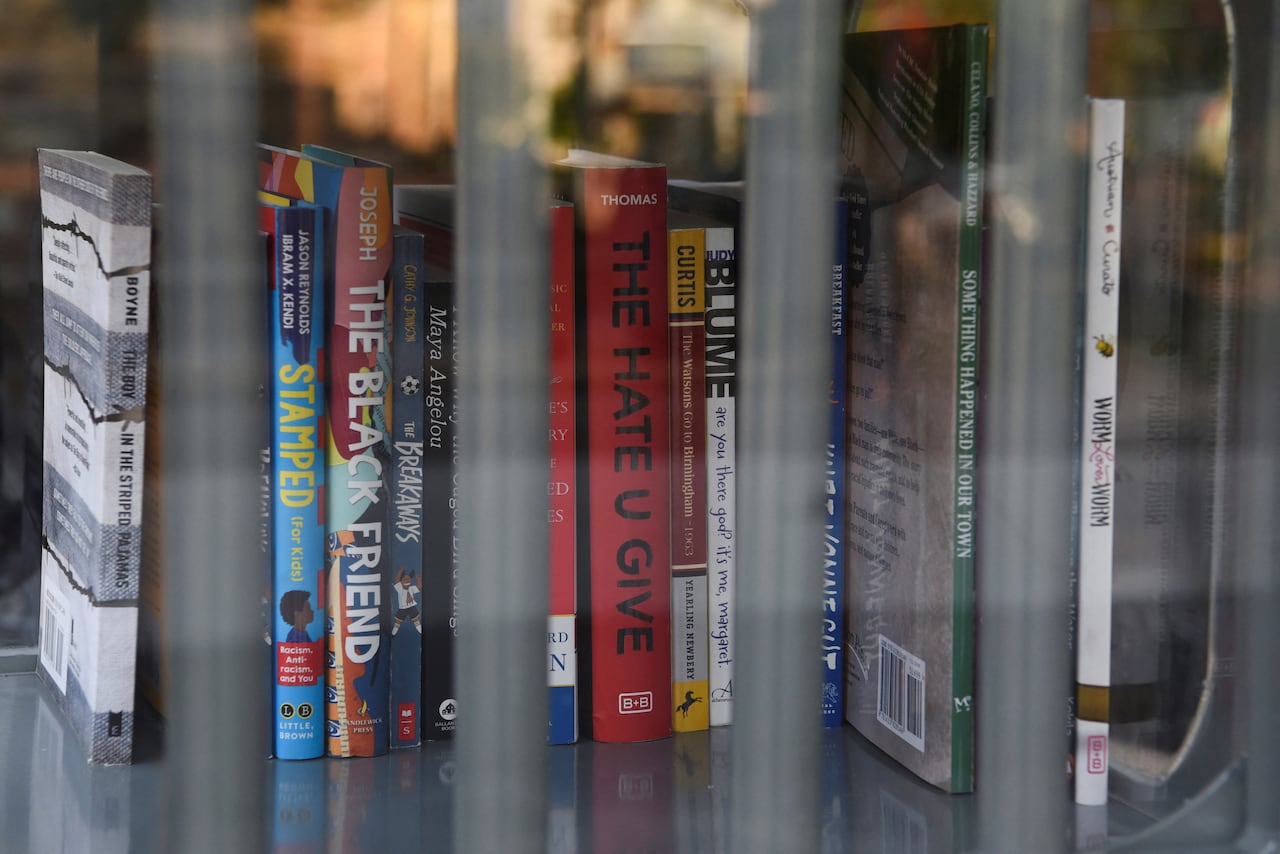As It Happens6:28Librarian fired after refusing to censor 2SLBTQ+ books wins $700K US settlement
Terri Lesley never expected to become a key figure in the heated debate about free speech and book bans that has embroiled libraries across the U.S. and Canada. And she certainly didn’t expect to get fired.
Now, more than two years after she was removed from her position as library system director in Campbell County, Wyo., she has been awarded a $700,000 US ($976,710 Cdn) settlement in a lawsuit over her termination.
“I’m relieved to have this outcome, and I believe it will help my community to move on,” Lesley told As It Happens host Nil Kӧksal.
“People that want to keep pushing an agenda to go against these library materials and the First Amendment [right to free speech], I hope they see this, and I hope it’s a deterrent.”
In her lawsuit, Lesley argues she was fired from her job after nearly 20 years because she refused to remove or restrict books with 2SLGBTQ+ themes and sexual content from library shelves in Gillette, Wyo.
The county denied Lesley’s claims. In court documents, it said Lesley was fired because of her performance — not the dispute over the books.
Campbell County pointed CBC to a statement from its insurance company’s attorney, which notes the settlement is “not an admission of any of the allegations.”
“Nobody won or lost,” the statement reads. “Rather, it reflects an agreement to settle the lawsuit early on before the expenses that are associated with litigation began to significantly mount.”
Under the settlement agreement, Lesley is dropping her lawsuit, though a separate lawsuit she has filed against three individuals who contested the books will continue.
How a Pride post changed everything
For most of Lesley’s decades of public service in Wyoming County, she says book challenges were exceedingly rare.
That all changed in 2021, she says, when the library’s public relations co-ordinator made a post on Facebook for Pride month highlighting their 2SLBGTQ+ collection.
Suddenly, the complaints started piling up. Three book challenges in August tripled to nearly 30 by the end of the year, according to the American Library Association (ALA).
“We’ve never had anything like this happen,” Lesley said. “I was caught off guard completely.”
As Canada sees growing challenges to books about sex ed, gender identity and gay themes, CBC’s The Fifth Estate uncovers how activists have declared a shadow war on local libraries.
The titles objected to in Gillette included This Book is Gay by Juno Dawson, How Do You Make a Baby by Anna Fiske, Doing It by Hannah Witton, Sex is a Funny Word by Corey Silverberg, and Dating and Sex: A Guide for the 21st Century Teen Boy by Andrew P. Smiler.
Complainants objected to the sexual nature of the books, many of which were aimed at teenage readers and appeared in the library’s young adult section.
But Lesley says it’s no coincidence that many of the challenged titles feature 2SLBTQ+ content.
“It was obvious to me that there was an anti-LGBTQ mindset,” she said.
“These community members spoke at public meetings about their feelings and so it was easy to understand where they were coming from and how they didn’t think these books should be accessed by youth because of the LGBTQ content.”
Lesley’s job is to work with the public, not against them, so she took an education-driven approach to the controversy.
“I tried to do educational things for the community to help them understand how public libraries work, how we have materials in our library for the entire community, how this kind of material is important to certain members of our community,” she said.
In 2022, the ALA gave Lesley its John Phillip Immroth Memorial Award, which honours “personal courage in defense of freedom of expression.”
The award was a balm at a time when she was facing a barrage of negativity, she says, including allegations she was peddling child pornography.
“It’s been a key factor in helping me to keep going,” she said. “I felt like I was going forward with something that people really cared about and that they appreciated that I’d taken a stand.”
But in 2023, Lesley was fired.
The books in question, she says, have been quietly moved to the adult section of the library, and the outcry has largely fizzled.
Libraries have become a battleground
Lesley’s firing came amid a backdrop of similar battles all over the U.S., and in Canada, too.
In 2023, the ALA recorded 9,021 book challenges in the U.S., up from 233 in 2015, and its third largest number on record since 1990. That number dipped to 5,813 in 2024.
The ALA says the majority, 72 per cent, of demands to censor or limit books in school or public libraries came from organized movements.
“The most common justifications for censorship provided by complainants were false claims of illegal obscenity for minors; inclusion of LGBTQIA+ characters or themes; and covering topics of race, racism, equity, and social justice,” the ALA said.

Rathod Mohamedbhai, the Denver-based law firm that brought forward Lesley’s case, has supported fired library employees elsewhere in recent years, including the case of a Texas teacher who was fired for reading her class passages from a graphic novel adaptation of Anne Frank’s diary.
Similar battles have played out in Canadian towns and schools.
In February, CBC’s The Fifth Estate analyzed more than a dozen hours of video footage, book challenge data, social media activity and secret recordings related to book challenges. It traced the book ban movement in Canada to a web of influence in the United States, where it says a right-wing, anti-2SLGBTQ+ campaign has led to laws that threaten libraries in Republican states.
Most recently, Alberta’s United Conservative Party government banned “sexually explicit” books from school libraries this summer.
The move prompted Edmonton Public Schools to assemble a list of 226 books to remove from shelves and classrooms, including well-known works such as The Handmaid’s Tale, The Color Purple, and I Know Why the Caged Bird Sings.
After public backlash, the province paused the new restrictions, then issued revised directives to pull books containing explicit images of sexual acts, but not written descriptions of the same.
Lesley says she fought to keep challenged books on the shelves because she believes in a citizen’s right to read, and a parent’s right to decide what’s appropriate for their own children, without limiting access for other people’s kids.
“It’s not the job of somebody who disagrees with the books to try to limit access to the kids who need the books,” she said.
Her lawyer, Iris Halpern, says she hopes her client’s settlement has a wider impact.
“We hope at least that it sends a message to other library districts, other states, other counties, that the First Amendment is alive and strong and that our values against discrimination also remain alive and strong,” Halpern said.
“These are public entities. They’re government officials. They need to keep in mind their constitutional obligations.”
Source link







